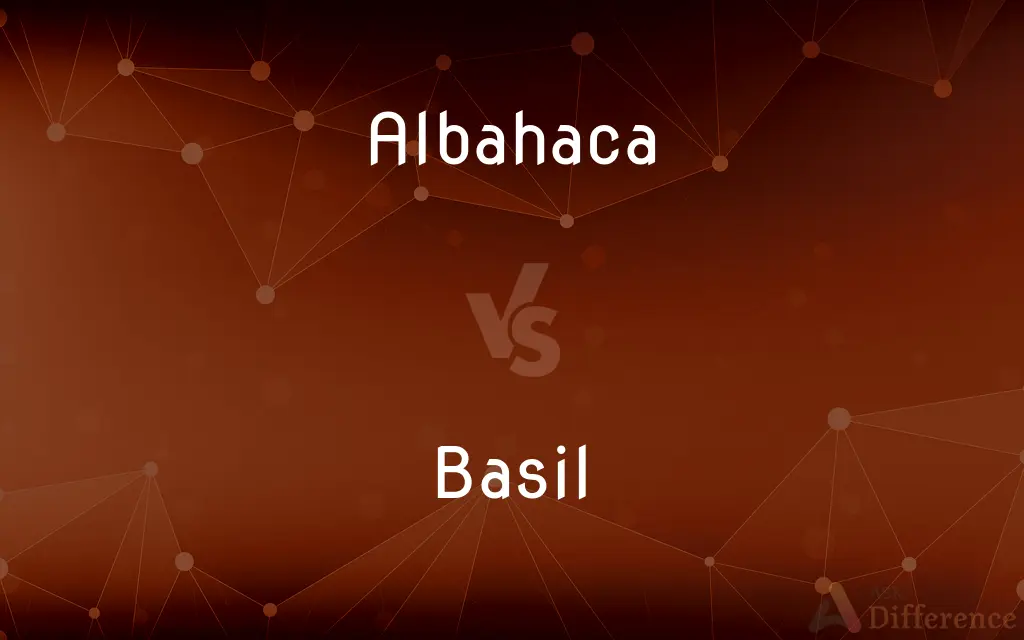Albahaca vs. Basil — What's the Difference?
Edited by Tayyaba Rehman — By Maham Liaqat — Updated on April 7, 2024
Albahaca is the Spanish term for basil, a popular herb used in various cuisines, essentially referring to the same plant.

Difference Between Albahaca and Basil
Table of Contents
ADVERTISEMENT
Key Differences
Albahaca is widely recognized in Spanish-speaking countries as a culinary herb known for its aromatic leaves. It is used in a variety of dishes to add flavor, ranging from pestos to salads. Basil, on the other hand, is the English term for the same herb, equally celebrated in cooking, particularly in Italian cuisine, for its fresh and slightly sweet flavor.
Both albahaca and basil are integral to Mediterranean cooking, reflecting their shared origins and culinary uses. While albahaca might be more commonly associated with Spanish or Latin American cuisines, basil is often linked with Italian and other Mediterranean dishes.
In terms of cultivation, albahaca (or basil) thrives in warm, tropical climates and is grown worldwide for its aromatic leaves. The herb is known for its versatility in both fresh and dried forms, although it is most flavorful when used fresh.
There are several varieties of albahaca/basil, including sweet basil, Thai basil, and lemon basil, each with distinct flavors and uses in cooking. This diversity underscores the herb's global popularity and adaptability to different culinary traditions.
Despite the difference in name, albahaca and basil refer to the same plant, Ocimum basilicum. The naming distinction simply reflects language differences, with no variation in the plant species or its culinary applications.
ADVERTISEMENT
Comparison Chart
Language
Spanish
English
Culinary Uses
Pesto, soups, salads, and more.
Pesto, pizzas, pastas, and more.
Origin
Used widely in Spanish-speaking regions.
Prominent in Italian and Mediterranean cuisine.
Varieties
Sweet, Thai, lemon basil, etc.
Sweet, Thai, lemon basil, etc.
Botanical Name
Ocimum basilicum
Ocimum basilicum
Compare with Definitions
Albahaca
Grows best in warm, sunny conditions.
La albahaca prospera en mi jardín durante el verano.
Basil
Thrives in sunny, warm environments, similar to albahaca.
My basil plants love the sunny spot on the windowsill.
Albahaca
Comes in various varieties, each with a unique flavor.
La albahaca limón añade un toque cítrico a los platos.
Basil
Often used fresh to maintain its flavor and aroma.
I always add basil at the end of cooking to preserve its flavor.
Albahaca
Spanish name for the herb basil, known for its aromatic leaves.
Añadió albahaca fresca a la salsa para darle más sabor.
Basil
Has several varieties, including sweet and Thai basil.
Thai basil gives a spicy kick to Asian dishes.
Albahaca
Used in traditional Spanish and Latin American cuisines.
La albahaca es indispensable en la cocina mediterránea.
Basil
Essential to Italian cuisine, particularly in pesto.
Basil is the star ingredient in traditional pesto.
Albahaca
Can be used in both fresh and dried forms.
Prefiero usar albahaca fresca en mis recetas.
Basil
An herb featuring a sweet, aromatic flavor, used in numerous dishes.
Fresh basil transformed the simple tomato sauce.
Albahaca
Albahaca may refer to: Ocimum campechianum ("albahaca de monte"), widespread across the Americas from Mexico southward. Ocimum basilicum, which is the basil ingredient for cooking, grown worldwide.
Basil
Basil (, also US: ; Ocimum basilicum), also called great basil, is a culinary herb of the family Lamiaceae (mints). Basil is native to tropical regions from central Africa to Southeast Asia.
Basil
An aromatic plant of the mint family, native to tropical Asia. The leaves are used as a culinary herb, especially in Mediterranean dishes
Garnish the baked pizza with fresh basil
Basil sauce
Basil
A European plant which grows in hedges and scrub.
Basil
An aromatic annual herb (Ocimum basilicum) in the mint family, native to Asia and Africa and widely cultivated for its leaves. Also called sweet basil.
Basil
The leaves of this plant used as a seasoning.
Basil
Any of various plants in the genus Ocimum, native to warm regions, having aromatic foliage and terminal clusters of small, usually white flowers.
Basil
A plant (Ocimum basilicum).
Basil
The leaves of this plant used as a herb.
Basil
Any other species in the genus Ocimum.
Basil
The angle to which a joiner's tool is ground away.
Basil
The skin of a sheep tanned with bark.
Basil
(transitive) To grind the edge of a tool to an acute angle.
Basil
The slope or angle to which the cutting edge of a tool, as a plane, is ground.
Basil
The name given to several aromatic herbs of the Mint family, but chiefly to the common or sweet basil (Ocymum basilicum), and the bush basil, or lesser basil (Ocymum minimum), the leaves of which are used in cookery. The name is also given to several kinds of mountain mint (Pycnanthemum).
Basil
The skin of a sheep tanned with bark.
Basil
To grind or form the edge of to an angle.
Basil
Any of several Old World tropical aromatic annual or perennial herbs of the genus Ocimum
Basil
(Roman Catholic Church) the bishop of Caesarea who defended the Church against the heresies of the 4th century; a saint and Doctor of the Church (329-379)
Basil
Leaves or the common basil; used fresh or dried
Common Curiosities
Can albahaca be used in Italian recipes?
Yes, albahaca can be used in Italian recipes just as basil would be, as they are the same herb.
How should albahaca or basil be stored for maximum freshness?
Both should be kept in a cool, dry place or in the refrigerator; basil can also be stored in a glass of water at room temperature.
Are there different types of albahaca or basil?
Yes, there are several varieties, such as sweet basil, Thai basil, and lemon basil, each with unique flavors.
Can I grow albahaca/basil indoors?
Yes, albahaca/basil can be grown indoors provided it has enough sunlight and water.
Can I substitute dried basil for fresh albahaca?
While you can, fresh albahaca/basil has a superior flavor, though dried basil is more concentrated.
What are the health benefits of albahaca/basil?
Albahaca/basil is known for its anti-inflammatory and antibacterial properties, as well as being rich in vitamins and minerals.
Why does my albahaca/basil plant wilt so quickly?
This could be due to overwatering, lack of sunlight, or being kept in very cold conditions.
Is albahaca different from basil in terms of taste?
No, albahaca and basil refer to the same herb and have the same taste profile.
Does albahaca/basil need full sunlight to grow?
Yes, it thrives in full sunlight but can tolerate partial shade.
Is there a best time to add albahaca/basil to dishes?
To preserve its flavor, it’s best to add albahaca/basil at the end of the cooking process.
Are albahaca and basil leaves the only usable parts of the plant?
Primarily, yes, though the flowers are also edible and can be used as a garnish.
What dishes are enhanced by the addition of albahaca/basil?
Albahaca/basil enhances pasta sauces, salads, pizzas, and more with its aromatic flavor.
How can I tell if my albahaca/basil is fresh?
Fresh albahaca/basil should have vibrant green leaves without dark spots or wilting.
How often should I water my albahaca/basil plant?
Water when the soil feels dry to the touch, avoiding overwatering.
Can albahaca/basil be frozen for later use?
Yes, both can be frozen, but they may lose some of their texture, though not their flavor.
Share Your Discovery

Previous Comparison
Measles vs. Chickenpox
Next Comparison
Headquarter vs. HeadquartersAuthor Spotlight
Written by
Maham LiaqatEdited by
Tayyaba RehmanTayyaba Rehman is a distinguished writer, currently serving as a primary contributor to askdifference.com. As a researcher in semantics and etymology, Tayyaba's passion for the complexity of languages and their distinctions has found a perfect home on the platform. Tayyaba delves into the intricacies of language, distinguishing between commonly confused words and phrases, thereby providing clarity for readers worldwide.














































